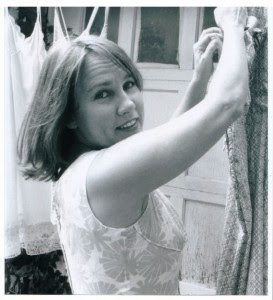What We’re Loving: All Kinds of Poetry
By Sadie Stein
June 8, 2012
When Anthony Heilbut isn’t producing beautiful gospel,
he tends to be writing—slowly—either about
German modernism or else about the music and musicians he loves. The Fan Who
Knew Too Much is the book Heilbut's gospel fans have been waiting
for since The Gospel Sound (1972). In this connection,
I can’t resist quoting our Southern editor right off the back cover: “Nothing
new in the last year gave me as much pure reading pleasure as pages of this
book. Heilbut ranges over the culture like a madman, but with a fierce sanity
in his eye, debunking myths and erecting new ones. I finished The Fan Who Knew Too Much
wondering how, without it, I’d ever thought I understood a thing about America
in the twentieth century. Let me ask: Are you familiar with the history of gays
in gospel? Or with the early, radio roots of soap operas? Then you too are
similarly benighted. Get with this.” Amen. —Lorin Stein
A friend sent me Sara Teasdale’s “There will come soft rains”—a wee poem
of six rhyming couplets that is sprightly and joyous (and makes me think of this Joe Brainard collage), until
the fourth stanza, when Teasdale subtly introduces a supreme darkness.There will come soft rains and the smell of the ground,
And swallows circling with their shimmering sound;
And frogs in the pools singing at night,
And wild plum-trees in tremulous white;
Robins will wear their feathery fire
Whistling their whims on a low fence-wire.
And not one will know of the war, not one
Will care at last when it is done.
Not one would mind, neither bird nor tree,
If mankind perished utterly.
And Spring herself when she woke at dawn,
Would scarcely know that we were gone.
She prefigures the advent of nuclear war by
twenty-five years, and the poem exists a perfect dollop of science fiction. Ray
Bradbury thought so, too. He borrowed the first line in 1950 for the title of a
short story, a tale that teases out the hint of ruin and death in the poem but
manages to preserve its quiet, beautiful horror. —Nicole Rudick
If you ever feel that you have a difficult job, take a
look at this excerpt from Working Man's
Death about a Nigerian meat market, and you might just
reconsider your grievances. Michael Glawogger’s 2005 documentary offers a
stunning and poignant portrait of hard manual labor in the modern era. Most
people in the world still earn their living by physical exertion; we just don’t
see them or hear about them very much. Sitting at a desk in an office, it’s easy
to forget that in so many jobs, the body itself is the machine. Here’s an
opportunity to be reminded. —Arthur
Holland Michel
Few of the great New York poets—for me, this means
Whitman, Crane, O’Hara, and Seidel—were natives of the city. This isn’t surprising;
it's the immigrants who bring new eyes to old places. Bronx-born Rowan Ricardo
Phillips is an exception. His first book of poems, The Ground, isn’t only about New
York—it’s also about myth and translation and how to be a troubadour in the
twenty-first century—but it has made me look at the city with renewed wonder
and excitement:
Staring at the wonders of Moses,
Who with a wave split the Bronx asunder
And dropped the Cross Bronx
Down in his wake,
May they know this map of the world
As only a map of the world.
One of many that will lead them
To and from their doors.
—Robyn Creswell
What is it about contemporary country music that makes
almost all self-respecting music lovers north of the Mason-Dixon Line squirm
with discomfort? With the exception of Johnny Cash, perhaps, country remains
for many the untouched genre, and it’s a shame indeed, for it seems to me that
one can find in the “white man’s blues”—when it’s done right—a certain subtle
yet unabashed yearning, an unassuming boldness that lifts the spirit and grips
the heart. Before you roll your eyes, give Iris Dement’s 1993 album Infamous Angel an
open-minded listen. The unpolished, back-country twang that is her charm is
perhaps not for everybody, but it gives way to a gorgeous soaring that’ll stick
with you (it’s one of those “when you get it, you really get it” type of
situations). With titles like “Hotter Than Mojave In My Heart” and lines like
“”He was the tender and I ordered a beer / It’s been forty years and I’m still
sitting here,” Dement’s songs have nothing if not character, but it’s the
jaunty and flawless “Let the Mystery Be,” a song about humility in the face of
the unknown, that I love the most. Hokey? Not a chance. —Anna Hadfield
http://www.theparisreview.org/blog/2012/06/08/what-were-loving-all-kinds-of-poetry/

















Nenhum comentário:
Postar um comentário